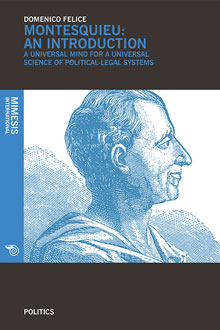What can Montesquieu still teach us today? Montesquieu was the first political writer who first formulated the principles of separation of powers and the independence of justice. He was the first to scientifically study human institutions, both ancient and modern, Asiatic and European, African and American. Again, he was the first thinker to theorize Federal Democracy, systematically tracking down the root causes of human events in its environmental, cultural, historical, and geographical aspects. Analysing several aspects of Montesquieu’s philosophical and political thought, this volume highlights his stoicism, realism, anti-despotism as well as his staunch defence of human dignity. Introducing one of the sharpest thinkers of modernity, this book offers fundamental tools to understand the very ground of our contemporary times.
Domenico Felice is Professor of History of Philosophy and of History of Political Philosophy (University of Bologna). He has written Pour l’histoire de la réception de Montesquieu en Italie (1789- 2005) (2006) and Los orígenes de la ciencia política contemporánea. Despotismo y libertad en el “Esprit de lois” de Montesquieu (2012).
TABLE OF CONTENTS
Chronological Table of Major Events in Montesquieu’s Life
Acknowledgements
Abbreviations
Montesquieu: An Introduction
1. Travelling the World
2. Oppression and Liberty: The Irreducible Dualism of Human Societies and Institutions
3. The Persian Letters: APhilosophical-political Treatise in the Form ofan Epistolary Novel
4. The Turning-point: The Treatise on Duties or Montesquieu’s Stoicism
5. The Real Voyage
6. Civilizations «Are Mortal»: Decline and Fall of the «Wisest People Upon Earth»
7. It Concerns and Affects Us All: Essay on the Causes that May Affect Men’s Minds and Characters
8. The Spirit of the Laws: The Foundation of a Universal Science of the Political-social Systems
8.1. Montesquieu against Hobbes
8.2. Despotism and liberty
8.3. Independence of justice and human dignity
8.4. The character of nations and the decline of States and civilizations
9. Conclusions
9.1. «Servitude always begins with drowsiness»
9.2. Montesquieu and his interpreters
Bibliography of the Writings of Domenico Felice
Index of Names

